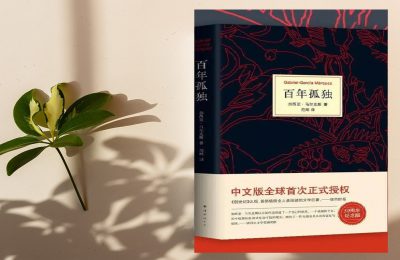《百年孤独》,是哥伦比亚作家加西亚·马尔克斯创作的长篇小说,是其代表作,也是拉丁美洲魔幻现实主义文学的代表作,被誉为“再现拉丁美洲历史社会图景的鸿篇巨著”。故事讲述马孔多小镇和布恩地亚家族的兴衰变化与传奇故事,记录了家族命运与百年历史,是重复地叙述相同而荒唐的命运,是拉美国家几百年命运的缩影,独具意味地隐喻着人类“文明”史的建立、发展与终结,在荒凉失落与荒唐可笑中诠释宿命式的轮回。家族中人物名字是相同或相近的,预示着他们拥有殊途同归的孤独命运。《百年孤独》以布恩地亚被捆在树上为开端,以他被蚂蚁吃掉为结束,通过细腻丰富的笔触、大胆自由的想象、魔幻的叙事艺术,讲述布恩地亚家族命运与历史,刻画人物孤独的灵魂与自我救赎,进而体现出个人、家族及全人类的悲悯与孤独情怀,让人们重新思考时代发展与人性变化。《百年孤独》被世界文坛誉为魔幻现实主义文学的主峰,已被翻译成30多种文字出版,销量逾1000万册。
Chapter 18
AURELIANO DID NOT leave Melquíades?room for a long time. He learned by heart the fantastic legends of the crumbling books, the synthesis of the studies of Hermann the Cripple, the notes on the science of demonology, the keys to the philosopher’s stone, the Centuries of Nostradamus and his research concerning the plague, so that he reached adolescence without knowing a thing about his own time but with the basic knowledge of a medieval man. Any time that Santa Sofía de la Piedad would go into his room she would find him absorbed in his reading. At dawn she would bring him a mug of coffee without sugar and at noon a plate of rice and slices of fried plantain, which were the only things eaten in the house since the death of Aureliano Segundo. She saw that his hair was cut, picked off the nits, took in to his size the old clothing that she found in forgotten trunks, and when his mustache began to appear the brought him Colonel Aureliano Buendía’s razor and the small gourd he had used as a shaving mug. None of the latter’s children had looked so much like him, not even Aureliano Jos? particularly in respect to the prominent cheekbones and the firm and rather pitiless line of the lips. As had happened to ?rsula with Aureliano Segundo when the latter was studying in the room, Santa Sofía de la Piedad thought that Aureliano was talking to himself. Actually, he was talking to Melquíades. One burning noon, a short time after the death of the twins, against the light of the window he saw the gloomy old man with his crow’s-wing hat like the materialization of a memory that had been in his head since long before he was born. Aureliano had finished classifying the alphabet of the parchments, so that when Melquíades asked him if he had discovered the language in which they had been written he did not hesitate to answer.
“Sanskrit,?he said.
Melquíades revealed to him that his opportunities to return to the room were limited. But he would go in peace to the meadows of the ultimate death because Aureliano would have time to learn Sanskrit during the years remaining until the parchments became one hundred years old, when they could be deciphered. It was he who indicated to Aureliano that on the narrow street going down to the river, where dreams had been interpreted during the time of the banana company, a wise Catalonian had a bookstore where there was a Sanskrit primer, which would be eaten by the moths within six years if he did not hurry to buy it. For the first time in her long life Santa Sofía de la Piedad let a feeling show through, and it was a feeling of wonderment when Aureliano asked her to bring him the book that could be found between Jerusalem Delivered and Milton’s poems on the extreme right-hand side of the second shelf of the bookcases. Since she could not read, she memorized what he had said and got some money by selling one of the seventeen little gold fishes left in the workshop, the whereabouts of which, after being hidden the night the soldiers searched the house, was known only by her and Aureliano.
